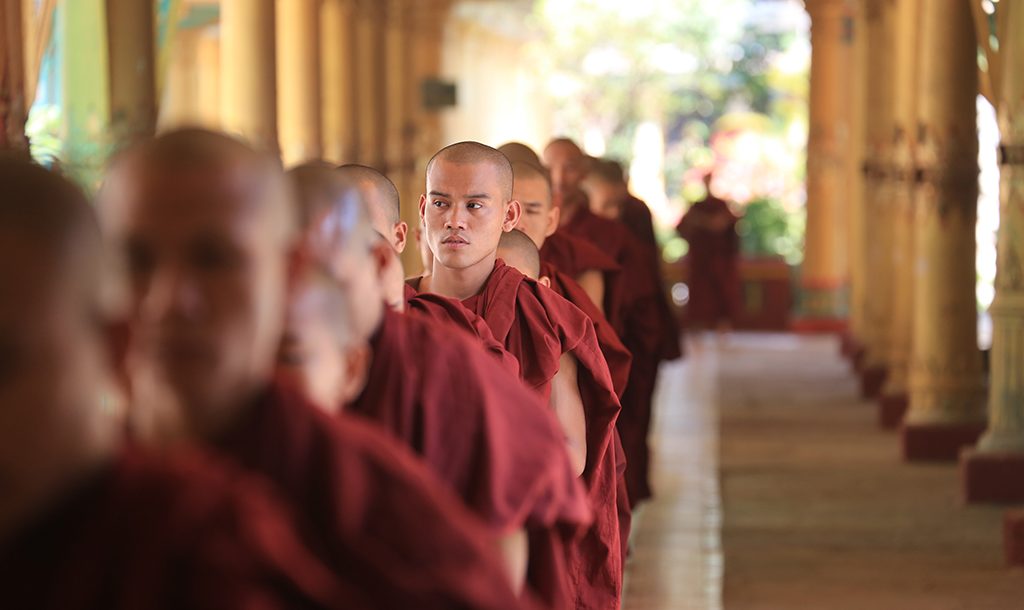James T Davies provides a summary of the religious roundtable at the 2017 Myanmar Update.
Religion in Myanmar is a sensitive issue, and will remain so for the foreseeable future.
The impact of religion on Myanmar society and politics was the focus of a panel exploring anti-Muslim sentiment at the 2017 Myanmar Update at ANU. A lively discussion offered new perspectives on religious participation, before concluding with an optimistic paper on the collection of positive inter-religious memories.
First, Thawng Tha Lian’s paper approached the role of the Christian church in Myanmar’s political transition, with a focus on Chin State. He argued that for Chin people, churches are uniquely placed to play a role in the nation’s democratic project, due to their strong social, legal and financial standing. This paper cited the experiences of church leaders in negotiations with armed groups and the government, as well as in ceasefire monitoring. Barriers to religious leaders’ participation in politics were also identified, however, including recent instances and memories of religious oppression by the government.
Next, Kyaw Zeyar Win gave a concise appraisal of the “securitisation” of the Rohingya community over time. It was argued that the Rohingya community have been constructed as a national security issue by the military in order to retain influence during Myanmar’s political transition.
Examining why this issue has become so intractable, Kyaw Zeyar Win argued that the securitisation of the Rohingya has been internalised and institutionalised. Furthermore, this has occurred at all levels of society. As this narrative is self-reinforcing, Kyaw Zeyar Win argues that de-securitisation is highly unlikely, and very difficult to challenge.
Attendees were then treated to a critical paper by Nyi Nyi Kyaw, revisiting state-Sangha relations. The paper challenged the accepted wisdom that Myanmar’s monks have long challenged Myanmar’s military regime, and cited examples from previous decades, as well as contemporary cooperation between the monks of the Organisation for the Protection of Race and Religion (MaBaTha), and the USDP party, comprised of former military rulers.
Complementing Kyaw Zeyar Win’s paper, Nyi Nyi Kyaw also touched upon the overt anti-Muslim campaign of MaBaTha, as well as the more covert anti-NLD campaign. The state remained silent on this issue, despite religious and legal restrictions on the use, or abuse, of religion in politics.
Finally, Matthew Walton delivered an update on an ongoing collaborative project with Matt Schissler and Phyu Phyu Thi. The latest results to emerge from this important study collects and shares memories of inter-religious peace across Myanmar. Worryingly, earlier work in this project suggested that younger generations were losing such memories. The paper argues that positive memories are powerful resources that have been drawn upon to prevent instances of communal violence in Myanmar in the recent past. These recollections can also challenge the hate-speech that remains widespread on social media and elsewhere. It is expected that stories of inter-religious peace will be distributed as print books and animations.
The papers presented on this panel offered original research and insights into their subject matter. Evidently, the majority of these papers were concerned with the intersection of religion and politics. Panellists and the panel chair noted that, outside of Myanmar, there remains much unknown in regards to the fascinating topic of religion in Myanmar.
James T Davies is a PhD candidate at the University of New South Wales, Canberra.
Listen to a recording of the panel here or in the player above.
 Facebook
Facebook  Twitter
Twitter  Soundcloud
Soundcloud  Youtube
Youtube  Rss
Rss 